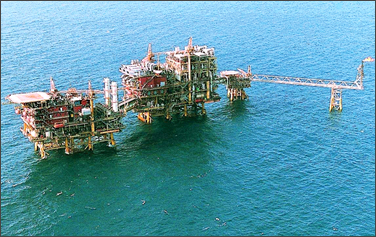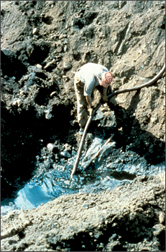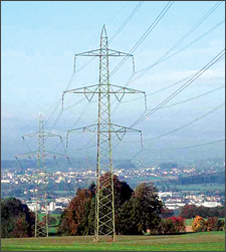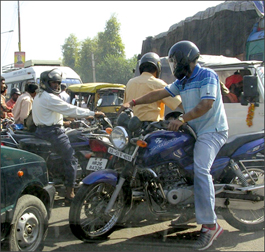|
Race to arrest fuel wastage on top gear:
Govt to checkmate crisis
By Dhaneshi Yatawara
[email protected]
 The huge increase of the global oil prices and some commodities has
led oil importing countries and developing countries to face immense
difficulties. The huge increase of the global oil prices and some commodities has
led oil importing countries and developing countries to face immense
difficulties.
There is a global call on the oil producer countries to employ
themselves in an effort to decrease the huge oil price hike lessening
the negative impact the price change has imposed worldwide.
Concern of the rich countries that who gain the benefit through the
accelerating crude oil prices, is the need of the hour, to cushion the
rough path the majority of the world are compelled to take.
Global oil price has reached 135 U.S. dollar a barrel, triggering
severe impacts on economy, politics and social life in many countries,
especially the countries which import oil and developing countries.
Leaders of affected countries and economists believe this world crisis
will disturb the Millennium Development Goals lined up to combat poverty
and create prosperity.
It is evident that the high oil price and increasing commodity prices
would trim the economic growth of the countries and in totality, the
world.
In the current scenario volatility seems to be the key factor. Prices
move several dollars daily almost in the absence of any fundamental
information.
Experts report that it is trading on the expectation of supply
conditions going forward.
Geopolitical commodity
  Oil and food are indispensable for the functioning of a society. All
nations require them. Shift in prices or availability of either can
swing relationships within and among nations. Hence they become
geopolitical commodities. Oil and food are indispensable for the functioning of a society. All
nations require them. Shift in prices or availability of either can
swing relationships within and among nations. Hence they become
geopolitical commodities.
Food obviously is the most immediate essential because it does not
take long to starve to death. Oil has a less immediate yet broader
impact. Everything depends on energy. Oil is world’s primary source of
energy particularly in transportation.
Oil price rose dramatically over the past year. When the barrel
passed 100 US dollars, it started hitting new heights. At the level of
120 US dollars a barrel, they clearly began to have a global impact.
This is in addition to the startling rise in the prices of food,
specifically grains.
Currently the world has realized that they can not expect the prices
to fall to the level that existed in year 2003.
The question is what would be the impact on economic systems of
individual countries and eventually the international system?
International oil prices started to increase sharply in 2004 and
reached to historically high levels in early 2005 and continue to be sky
rocketing. The price of Brent crude oil increased to US dollars 56 per
barrel in March 2005, compared to the previous highest price of US
dollars 52 per barrel in October 2004.
The average crude oil import price of Ceylon Petroleum Corporation
(CPC) during the first quarter of 2005 has increased by 20 per cent to
around US dollars 45 per barrel compared to the average price of US
dollars 38 per barrel in 2004.In approximately 24 hours from May 21 to
May 22, 2008, the price per barrel of oil passed $135.
Be penny-wise
 Last week, President Mahinda Rajapaksa appealed to the public to use
petroleum products more economically to the greatest possible level to
face the current global oil crisis. The President reiterated that the
Government is drafting long term and short term measures that will be
announced soon. Last week, President Mahinda Rajapaksa appealed to the public to use
petroleum products more economically to the greatest possible level to
face the current global oil crisis. The President reiterated that the
Government is drafting long term and short term measures that will be
announced soon.
If the present consumption trends continue Sri Lanka will have to
spend four billion US dollars a year on petroleum imports.
In a research done by Prof. Amal S. Kumarage, Chairman of the
National Transport Commission, 830,000 people arrive in Colombo city
daily and of which 750,000 people reach by road. Only the balance 10%
use the railway system.
750,000 people who arrive in 200,000 vehicles made up as follows:
* 11,000 buses
* 15,000 goods vehicles
* 175,000 private vehicles
In addition to the vehicles entering the city, there are a further
250,000 vehicles registered within the Colombo Municipal area! These
statistics are confined to the Colombo city and yet the inefficiency and
ineffectiveness is clearly visible.
 Prof. Kumarage’s research further notes that 15% of the road space is
utilised for buses and vans even though they transport 80% of the road
passengers. On the other hand, 65% of the road space is used by private
and hired vehicles which carry only 38% of the passengers. The balance
20% is for vehicles transporting goods. Prof. Kumarage’s research further notes that 15% of the road space is
utilised for buses and vans even though they transport 80% of the road
passengers. On the other hand, 65% of the road space is used by private
and hired vehicles which carry only 38% of the passengers. The balance
20% is for vehicles transporting goods.
May be now it is high time for all Sri Lankans to evaluate whether we
are travelling on the correct path!
“We have to reduce consumption and by extension, oil imports.
Otherwise there will be a major crisis,” Ceylon Petroleum Corporation
(CPC) Chairman Asantha de Mel said, the ‘Daily News’ newspaper reported
on last Wednesday.
The Chairman further explaining stated that when prices were
previously raised in January a barrel of diesel was 103 US dollars.
Currently it has passed 174 US dollars a barrel.
The monthly requirement of diesel is high as 145 million litres. A
litre of diesel costs Rs. 122 even before it is imported without adding
freight and other costs, de Mel adds in the report.
The CPC Chairman further stated, reiterating on the grave importance
of saving fuel that it is loosing 170 million rupees a day on fuel
subsidies and even with the new price revisions there is a substantial
loss. According to the CPC the refinery upgrade will take another three
to four years and then it will be possible to process more crude oil
locally.
Park n’ Ride
According to statistics 72% of the country’s population use the
public transport systems whereas 28% owns private vehicles.
According to Transport Minister Dullas Alahapperuma they intend to
introduce a novel ‘Park and Ride Concept’. This intend to save 40
billion rupees wasted due to the huge traffic congestions in Colombo
city by setting up three new vehicle parks, for the vehicles entering
Colombo city and then deploy a super luxury shuttle service to transport
the people.
Accordingly the first intended vehicle park will be set up in
Katubedda, Moratuwa as the first phase of the project followed by two
other parks in Peliyagoda and Nugegoda.
Another plan is being drafted to convert 300,000 three wheelers to
run on LP gas.
The Government has also increased the subsidy granted to the public
transport sector from Rs. 30 per litre to Rs. 50. This will be extended
to the private bus sector as well.
Save electricity - save oil
Of the daily electricity consumption, which is 29 million units, 65%
is generated in thermal stations depending on fuel. Almost one third of
the total fuel imports were used for electricity generation and the
Government spends 100 billion rupees annually on it.
One third of the Government’s total foreign exchange earnings are
spent on fuel imports annually.
The Ministry of Power and Energy revealed last week that six million
electricity units can be saved daily if consumers use electricity
sparingly.
According to statistics available with the Ministry, 20% of the total
consumption is wasted in the domestic, industrial and commercial
sectors. 3.8 million consumers are within these three sectors.
Factor beyond the seas
The increase in fuel price is a factor beyond the control of any
Government of oil importing countries.
High oil prices are likely to first affect less affluent countries,
particularly the developing world, with less discretionary income. Oil
is often used for electricity generation, as well as private transport.
The World Bank has looked more deeply at the effect of oil prices in the
developing countries.
An analysis finds that in South Africa a 125 percent increase in the
price of crude oil and refined petroleum reduces employment and GDP by
approximately 2 percent, and reduces household consumption by
approximately 7 percent, affecting mainly the poor.The biggest winners
are the countries of the Arabian peninsula.
Although somewhat strained, these countries never really suffered
during the period of low oil prices. They have now more than rebalanced
their financial system and are making the most of it. This is a time
when they absolutely do not want anything disrupting the flow of oil
from their region.
The big losers are countries that not only have to import oil but
also are heavily industrialized relative to their economy. Countries in
which service makes up a larger sector than manufacturing obviously use
less oil for critical economic functions than do countries that are
heavily manufacturing-oriented.
The victory is not only economic but political as well. The ability
to control where exports go and where they don’t go transforms into
political power. Suddenly, the regional dynamics have changed.
|
